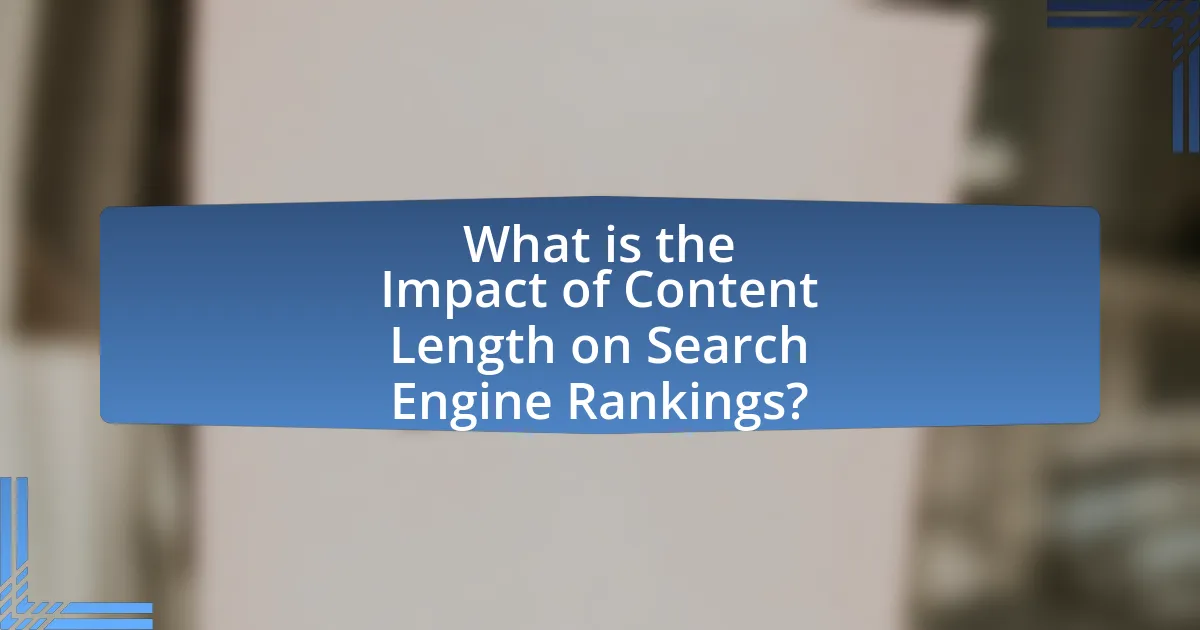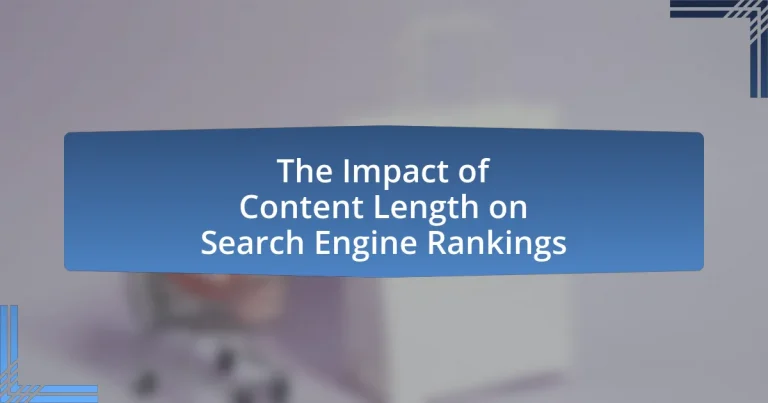The article examines the impact of content length on search engine rankings, highlighting that longer content, typically exceeding 1,500 words, tends to perform better in search results. Research indicates that comprehensive articles align with user intent, leading to higher visibility and engagement. Key factors influencing search engine algorithms include user engagement metrics, comprehensiveness, and relevance, with studies showing that longer content correlates with improved dwell time and lower bounce rates. The article also discusses optimal content lengths for various types of content and addresses common misconceptions regarding content length and SEO practices.

What is the Impact of Content Length on Search Engine Rankings?
Content length significantly impacts search engine rankings, with longer content generally performing better. Research indicates that articles with over 1,500 words tend to rank higher on Google, as they often provide more comprehensive information, which aligns with user intent. A study by Backlinko analyzed 1 million Google search results and found that the average word count of top-ranking pages was around 1,890 words. This suggests that search engines favor in-depth content that thoroughly addresses topics, leading to higher visibility and engagement.
How does content length influence search engine algorithms?
Content length significantly influences search engine algorithms by affecting the perceived quality and relevance of web pages. Search engines, particularly Google, often favor longer content because it tends to provide more comprehensive information, which can enhance user satisfaction. Studies have shown that articles with higher word counts generally rank better in search results; for instance, a study by Backlinko found that the average content length of a top-ranking page is around 1,890 words. This correlation suggests that search engines may interpret longer content as more authoritative and informative, leading to improved rankings.
What specific factors do search engines consider regarding content length?
Search engines consider several specific factors regarding content length, primarily focusing on user engagement, comprehensiveness, and relevance. User engagement metrics, such as time spent on a page and bounce rates, indicate whether content length meets user expectations; longer content often correlates with higher engagement. Comprehensiveness is assessed through the depth of information provided, as longer articles can cover topics more thoroughly, which search engines favor for delivering quality results. Relevance is determined by how well the content length aligns with search queries; for instance, longer content may be prioritized for complex topics that require detailed explanations. Studies have shown that articles exceeding 1,500 words tend to rank higher in search results, reinforcing the importance of content length in SEO strategies.
How does content length correlate with user engagement metrics?
Content length positively correlates with user engagement metrics, as longer content typically provides more comprehensive information, leading to increased time spent on the page and lower bounce rates. Research by HubSpot indicates that blog posts with a word count of 2,000 words or more receive significantly higher engagement, with an average of 77% more backlinks and 55% more page views compared to shorter posts. This suggests that users are more likely to engage with in-depth content that thoroughly addresses their queries, thereby enhancing overall user interaction and satisfaction.
Why is content length important for SEO?
Content length is important for SEO because longer content tends to provide more comprehensive information, which can lead to higher search engine rankings. Search engines like Google prioritize content that thoroughly addresses user queries, and studies have shown that articles with a word count of over 1,500 words often rank better than shorter pieces. For instance, a study by Backlinko analyzed 11.8 million Google search results and found that the average content length of a top-ranking page was 1,890 words. This indicates that longer content is often perceived as more valuable and relevant, enhancing its visibility in search results.
What role does content length play in keyword optimization?
Content length significantly influences keyword optimization by affecting search engine rankings and user engagement. Research indicates that longer content, typically exceeding 1,500 words, tends to rank higher on search engine results pages (SERPs) because it allows for more comprehensive coverage of keywords and related topics. A study by Backlinko found that the average content length of a top-ranking page is around 1,890 words, demonstrating a correlation between content length and higher rankings. This extended length provides opportunities to naturally incorporate keywords, synonyms, and related phrases, enhancing relevance and authority in the eyes of search engines.
How does longer content affect dwell time and bounce rates?
Longer content generally increases dwell time and decreases bounce rates. This occurs because comprehensive articles provide more valuable information, encouraging readers to stay engaged longer. Research indicates that content exceeding 1,500 words tends to perform better in terms of user engagement metrics, as it often covers topics in greater depth, answering more questions and addressing user intent effectively. For instance, a study by HubSpot found that blog posts with over 2,000 words receive significantly more organic traffic and engagement compared to shorter posts, demonstrating a clear correlation between content length and user retention.
What are the optimal content lengths for different types of content?
The optimal content lengths for different types of content vary based on the format and purpose. For blog posts, the ideal length is typically between 1,500 to 2,500 words, as studies show that longer articles tend to rank better in search engines due to their comprehensive nature. For social media posts, a length of 40 to 80 characters is optimal for engagement, while videos should ideally be between 7 to 15 minutes to retain viewer attention. Research by HubSpot indicates that content around 2,000 words receives the most organic traffic, reinforcing the importance of length in search engine rankings.
How does the ideal content length vary by industry or topic?
The ideal content length varies significantly by industry or topic, with different sectors favoring different word counts for optimal engagement and search engine rankings. For instance, blog posts in the technology sector often perform best at around 1,500 to 2,500 words, as detailed in a study by HubSpot, which found that longer content tends to attract more backlinks and shares. Conversely, content in the fashion industry may thrive with shorter articles, typically ranging from 800 to 1,200 words, as audiences often prefer quick, visually appealing reads. Research from Backlinko indicates that the average content length of top-ranking pages on Google is approximately 1,890 words, suggesting that industries focusing on in-depth analysis, such as finance or healthcare, benefit from longer, more comprehensive articles. Thus, the ideal content length is not uniform but tailored to the specific audience and industry standards.
What are the recommended word counts for blog posts, articles, and landing pages?
The recommended word counts are approximately 1,000 to 2,500 words for blog posts, 1,500 to 3,000 words for articles, and 300 to 800 words for landing pages. Research indicates that longer content tends to perform better in search engine rankings, with a study by HubSpot showing that blog posts with over 2,000 words receive more traffic and backlinks compared to shorter posts. Additionally, articles that are comprehensive and well-researched often rank higher, as they provide more value to readers, which is a key factor in SEO. For landing pages, concise and focused content is essential to drive conversions, hence the shorter recommended word count.
How can content length be effectively measured and analyzed?
Content length can be effectively measured and analyzed by utilizing word count tools and readability metrics. Word count tools provide a straightforward numerical value representing the total number of words in a piece of content, which is essential for assessing whether the length aligns with industry standards or specific SEO guidelines. Readability metrics, such as the Flesch-Kincaid Grade Level or the Gunning Fog Index, further analyze content length by evaluating sentence structure and complexity, offering insights into how length impacts audience engagement and comprehension. Research indicates that longer content, typically exceeding 1,500 words, tends to rank better in search engine results, as it often provides more comprehensive information, thereby increasing dwell time and reducing bounce rates.
What tools can be used to assess content length and its impact on rankings?
Tools that can be used to assess content length and its impact on rankings include SEMrush, Ahrefs, and Moz. SEMrush provides insights into keyword rankings and content length analysis, allowing users to compare their content against top-ranking pages. Ahrefs offers a content explorer feature that analyzes the length of successful articles and their corresponding traffic metrics. Moz’s Keyword Explorer helps assess content length in relation to keyword difficulty and search volume, providing a comprehensive view of how content length affects rankings. These tools are widely recognized in the SEO community for their ability to correlate content length with search engine performance.
How can content length be tested for effectiveness in SEO strategies?
Content length can be tested for effectiveness in SEO strategies by analyzing its correlation with search engine rankings and user engagement metrics. This can be achieved through A/B testing, where different content lengths are published on similar topics to compare their performance in terms of organic traffic, bounce rates, and average time on page. Research indicates that longer content, typically over 1,500 words, tends to rank higher in search engine results, as evidenced by a study from Backlinko, which found that the average content length of a top-ranking page is around 1,890 words. By systematically measuring these metrics, SEO practitioners can determine the optimal content length that maximizes visibility and user interaction.
What are the common misconceptions about content length and SEO?
Common misconceptions about content length and SEO include the belief that longer content always ranks better and that word count alone determines quality. While longer articles can provide more comprehensive information, search engines prioritize content relevance, user engagement, and quality over sheer length. Research by Backlinko indicates that the average content length of top-ranking pages is around 1,890 words, but this does not imply that all content must meet this length to succeed. Additionally, shorter, well-optimized content can outperform longer articles if it effectively addresses user intent and provides valuable insights. Thus, focusing solely on content length can lead to neglecting other critical SEO factors such as keyword optimization, readability, and user experience.
Why do some believe that longer content always ranks better?
Some believe that longer content always ranks better because it tends to provide more comprehensive information, which can enhance user engagement and satisfaction. Search engines like Google prioritize content that answers user queries thoroughly, and studies have shown that longer articles often receive more backlinks and social shares, indicating higher authority and relevance. For instance, a study by Backlinko analyzed over 11 million search results and found that the average content length of a top-ranking page was over 1,400 words, suggesting a correlation between content length and search engine ranking.
How can misleading information about content length affect SEO practices?
Misleading information about content length can negatively impact SEO practices by causing content creators to either underproduce or overproduce content. When creators believe that a specific word count is necessary for optimal rankings, they may either produce content that is too short to provide value or excessively long content that dilutes the main message. Research from Backlinko indicates that longer content tends to rank higher on Google, with the average top-ranking article containing over 1,800 words. However, if creators focus solely on word count without considering quality, they risk creating low-value content that fails to engage users, leading to higher bounce rates and lower rankings. Thus, accurate information about content length is crucial for effective SEO strategies.
What best practices should be followed regarding content length for SEO?
For optimal SEO performance, content length should generally be between 1,500 to 2,500 words. Research indicates that longer content tends to rank better on search engines, as it often provides more comprehensive information, which enhances user engagement and dwell time. A study by Backlinko found that the average content length of a top-ranking page on Google is around 1,890 words, demonstrating a clear correlation between longer content and higher rankings. Additionally, content should be structured with relevant keywords and subheadings to improve readability and SEO effectiveness.
How can writers balance content length with quality and relevance?
Writers can balance content length with quality and relevance by focusing on delivering concise, informative content that directly addresses the needs of their audience. This approach ensures that each piece of content is both engaging and valuable, which is crucial for maintaining reader interest and improving search engine rankings. Research indicates that articles with a word count between 1,500 and 2,500 words tend to perform better in search engine results, as they often provide comprehensive information while remaining focused on specific topics. By prioritizing clarity and relevance over sheer length, writers can create content that meets both user expectations and search engine algorithms effectively.
What strategies can be employed to optimize content length for better rankings?
To optimize content length for better rankings, focus on creating comprehensive, in-depth articles that address user intent while maintaining readability. Research indicates that longer content, typically over 1,500 words, tends to rank higher on search engines due to its ability to provide detailed information and answer multiple related queries. For instance, a study by Backlinko found that the average content length of a top-ranking page is around 1,890 words, suggesting that search engines favor thorough content that satisfies user needs. Additionally, using subheadings, bullet points, and concise paragraphs can enhance user engagement and comprehension, further improving ranking potential.


